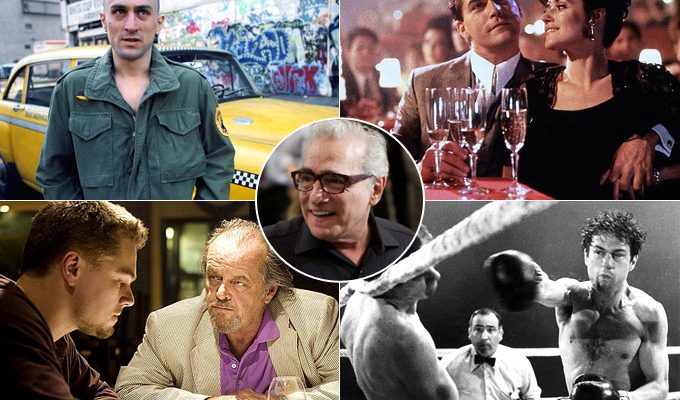 “The King of Comedy” (1982)
“The King of Comedy” (1982)
It’s telling that, in any other director’s body of work, a character like Rupert Pupkin would be a defining achievement. With muse Robert De Niro, Scorsese looked to the lighter side to bring forth a face of fame touched upon in “Taxi Driver” and semi-realized in the otherwise-claustrophobic “Raging Bull”: that of the dark side of celebrity. Rightfully, De Niro has been canonized for a roll call of brilliant characterizations, and Pupkin is another one, an obnoxious, delusional, conceited fool who nonetheless maintains the fast-talking skills to squeeze past the doors of people who will not have him. Jerry Lewis’ toxic talk show host Jerry Langford is an equal achievement, an absolutely vain showbiz lifer who drips contempt for his fans like the syrup cascading down a stack of golden IHOP pancakes. “The King Of Comedy” wrangles laughs out of these two as Pupkin’s desperate reach for stardom becomes violently aggressive, but it’s also just frightening to see these two even speak: De Niro’s Pupkin is a snake with a smile, and his utter incompetence gives his threats teeth: he might just shoot you by accident. Langford fires absolute daggers through Lewis’ stubborn face, his slow-burn silence says what some actors need multiple monologues to express. Gorgeous and creepily ambiguous, this satire is also probably one of Scorsese’s most actor-friendly films, offering up two titans blurring the lines between funny, cringeworthy and flat-out terrifying. [A]
 “After Hours” (1985)
“After Hours” (1985)
There’s a certain sensation that comes with being up all night, broke, tired, and in way over your head, an intangible sensation that courses through your veins like a narcotic. It’s the sort of awareness you only feel on the hairs prickling from the back of your neck, the sort that makes you feel like Superman but also tests you by giving the impression that danger is around every corner. This discarded Tim Burton project (uh-huh, really) stands alone in the Scorsese oeuvre as being lighter, funnier, and more playful than his usual work, but in truth it’s still laced with the same nervous, dangerous energy as “Mean Streets.” For once, Scorsese’s protagonist is something of a beta male: Paul (Griffin Dunne) is a put-upon everyman who mistakenly believes he’s entitled to a night out on the town, only for New York City to chew him up and spit him out. The picture is both light on its feet but saturated in foreboding, as every single wrong turn forces Paul face-to-face with criminals, shady artists and kink peddlers from a New York City that seems miles away from his comfort zone. What’s amusing is that “After Hours” doesn’t dip into the sort of violence or dark slapstick of something like John Landis’ “Into The Night,” but still maintains an edge that nonetheless feels in the spirit of the Keaton-Chaplin era, where overstressed silent stars faced insurmountable odds. It’s gleefully bent, but unmistakably a Scorsese picture, pitched a different tempo to some of the classics of his that more immediately spring to mind, but no less deserving of attention. [A-]
 “The Color of Money” (1986)
“The Color of Money” (1986)
Though this sequel to the classic “The Hustler” is not quite up to par with the 1961 original, it has aged quite well and proves better than its original reputation suggests. When it was released in 1986 the film did well commercially but was greeted with mostly mixed reviews (Siskel and Ebert both gave it a thumbs down). It’s definitely minor Scorsese, but it’s a blast to watch and features a wonderful Paul Newman performance as he stepped back into the shoes of pool shark “Fast” Eddie Felson (and won a long-deserved Best Actor Oscar for his efforts). Here he’s playing the mentor to none other than Tom Cruise, who also gives a wonderful turn as a cocky up-and-coming hustler. The standout sequence sees Scorsese doing what he does best, marrying a perfectly selected pop song with his trademark zippy camera as Cruise works the crowd around his table to the sounds of Warren Zevon’s “Werewolves of London.” And really, most of the film plays like this sequence, with loads of stylish camera flair set around the standard Scorsese milieu of bars and pool halls. The soundtrack is ace, as are the pieces of original score by former The Band member Robbie Robertson. It’s a film that helped Scorsese finally earn the clout to make his passion project “The Last Temptation of Christ,” but even as a means to an end (or even as a one-for-them type project) it’s an utterly watchable, top-notch sports/gambling picture that saw the emergence of the director as an occasional studio gun-for-hire. It may not be from his guts but he still does great work here simply making a piece of entertainment. [B]

